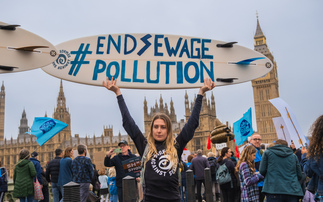The news Ineos has lobbied against EU pollution rules provides a further reminder of the huge environmental risks inherent to a 'no deal' Brexit
Here we are then. Five days from the original exit date, either three weeks or eight weeks from the new exit date, and still not the faintest idea what happens next.
Wherever you sit on the political spectrum, however you voted three years ago, this simple fact is an outrage. A failure of governance, management, and basic competence completely unprecedented in many of our lifetimes. The protests may have been peaceful (so far), the capital flight may have been an undemonstrative brook rather than a raging torrent (so far), there may still be a route forward that avoids a full scale catastrophe (for now), but it is important to remember this is a full-blown, entirely self-imposed, hugely damaging, crisis.
The CBI and TUC may have joined forces last week to warn of a "national emergency", but throughout much of the interminable Brexit process businesses have genuinely pulled their punches for fear of being dragged into an increasingly volatile culture war. The reality is the entire British economy - the billions of pounds of capital, the millions of livelihoods and households, the countless thousands of communities and small businesses, the daily choices that make up the hopes and dreams of a nation - has no idea what its trading arrangements, and in a very real sense what its place in the world, will amount to next month. This is no way to run a whelk stall, let alone an economy that is one of the powerhouses of the modern world. Again, it is an outrage.
If there is any justice there will be public inquiries, sweeping political and constitutional reform, and a changing of the political guard right across Westminster. However, there is nothing in the past three years to suggest this urgently needed political rejuvenation will emerge and for now the focus has to be on what happens today, this week, this month.
A vast array of scenarios are now possible, even if none of them yet feel probable. For the green economy and the wider environmental movement only two things are certain: the entire fiasco is a huge distraction from the more important task of tackling climate change and building a modern, healthy, net zero emission economy; and there is no scenario worse than a 'no deal' Brexit.
The Brexit caravan is now moving so fast, pulling in so many different directions, and populated by so many unicorns and clown cars that it is easy to lose sight of the fundamentals. But it is worth recalling why so many environmental campaigners and green business leaders have warned both publicly and privately that a 'no deal' Brexit would be a "catastrophe" for the UK environment. It is also worth remembering that while Parliament has voted against allowing a no deal Brexit it still remains both the default option and the preferred choice for the political tribe that has dominated the Brexit narrative at every turn and now looks set to drive the Prime Minister from office.
There are broadly three main risks: practical, economic, and political.
Practically, the UK's system of environmental governance and its green economy are simply not ready for a 'no deal' exit next month. There would be immediate environmental impacts in the form of increased congestion around ports and diesel generators in Northern Ireland. There would be a huge environmental enforcement gap as already chronically overstretched UK agencies are forced to replicate the work of their erstwhile European colleagues. There would be new tariffs and trade barriers for the internationally interconnected clean tech sector. There would be administrative costs and duplication as companies are forced to navigate UK versions of the REACH chemicals regime and the EU emissions trading scheme. In short, it will be an almighty mess.
The good news (these things are relative) is that the practical challenges should prove relatively short-lived. You would hope that within a few months, or perhaps a few years, the immediate 'no deal' fallout will have been navigated and a new governance regime will have taken shape.
However, the economic risks are likely to prove much more damaging and for far longer. You can brand it Project Fear all you like, but it is all but inconceivable that the UK can tear up its trading arrangements with its largest trading partner, torch its international reputation for studied pragmatism, and revert to WTO rules without triggering an economic recession. Companies would relocate, either immediately or gradually over time, investment would be diverted, consumer confidence would stall. Recessions may lead to lower greenhouse gas emissions in the short term, but they also badly damage the conditions required to drive rapid and sustained investment in urgently needed low carbon infrastructure. If securing government funding for energy efficiency or clean tech R&D is difficult currently, imagine what it will be like when the tax take is falling and an understaffed NHS is pushed even further into crisis.
The ever improving cost-competitiveness of renewables and electric vehicles would mean the green economy would fare better than many other parts of the economy, but let us not pretend that a self-induced recession precisely at the moment when a step change in the pace of decarbonisation is required is anything other than a disaster.
These economic fears play into arguably the biggest environmental risk associated with a 'no deal' Brexit: the risk of a tilting of the UK's political axis towards the deregulatory, low tax, high pollution, Trumpist, Neo-Thatcherism on (private healthcare) steroids vision openly espoused by some of Brexit's loudest cheerleaders.
It is important to remember that this is not an end state aspired to by all Brexiters. There are those who favour a 'no deal' Brexit out of a principled desire to maximise UK sovereignty. You can argue that such an extreme interpretation of sovereignty is a self-harming pursuit of a scenario that is simply incompatible with a modern, interconnected economy, but there are legitimate reasons for thinking a nation should have as much control over its own affairs as possible, even if those reasons do have a nasty habit of tipping over into nativist rhetoric in the wrong hands. There are MPs who oppose Theresa May's deal, see a no deal exit as the preferable route forward, but would abhor the idea that the next step in this journey into the unknown could be a rolling back of environmental standards and a dilution of the UK's decarbonisation ambitions.
However, for many of the leading advocates of the hardest possible Brexit the focus seems to be less on the principle of maximised sovereignty and more on what that sovereignty would allow them to achieve, i.e. immigration crackdowns for the Farageists and deregulation and laissez faire economics for the Ayn Rand fanboys. It is important not to overcomplicate things. Brexit always was a project of the right wing of the Conservative Party, by the right wing of the Conservative Party, for the right wing of the Conservative Party. There are reasons why a large part of this political tribe now want to torch their previous assertions that the UK would leave the EU with a trade deal and now seek to crash out. There are some ERG types who favour environmental protections, but it is important to remember that many of their colleagues are openly hostile towards the concept of regulation and the need for climate action.
There was a useful reminder of what is at stake over the weekend, as the Unearthed website reported that INEOS has lobbied against it having to comply with EU pollution rules at one of its Teesside plants. Can it be a coincidence that one of the handful of high profile businessmen to back Brexit, INEOS' Sir Jim Ratcliffe, has had specific issues with EU environmental rules?
All the signs are that a rogue's gallery of failed Cabinet ministers are now lining up the curtains in Number 10 in the hopes they will soon be in a position to decide what the UK's future regulatory framework looks like. The list of Tory leadership hopefuls who are either on the record or reportedly keen on wanting to see a post Brexit rolling back of environmental standards is almost as long as the list of Tory leadership hopefuls with close ties of climate sceptic US lobby groups. Both lists are much longer than the list of leadership hopefuls that have publicly voiced support for bolder climate action - a list which starts with Michael Gove, ends with Amber Rudd, and has no-one in between. The likelihood is that the next Prime Minister will be either hostile or indifferent to strong environmental policies.
The hope is that even after a no deal Brexit there would still be an overwhelming majority in parliament and the country for ever stronger climate and environmental measures. An environmental catastrophe is far from inevitable, even if there are short term problems. The risk of the next Prime Minister unpicking decades of environmental policy, or more prosaically simply deliberately failing to keep pace with the urgent requirement for more ambitious measures, remains relatively small.
But there is no doubt these risks increase drastically under a no deal scenario. After all, there is a majority in parliament for averting a no deal Brexit and according to the latest polls a majority in the country for remaining the EU, and look where that has got us. The prospect of a populist post-Brexit government exploiting an economic crisis and a breakdown in relations with the UK's closest neighbours to engineer a new pollutocrat-friendly policy framework is not to be discounted. If President Trump teaches us anything it is that economics, moral decency, basic principles of risk management, and majority public opinion can all be defied, even in an advanced democracy.
Wherever the UK lands at the end of this week, there are huge risks for the green economy. The non-binding nature of the Withdrawal Agreement means that even if Theresa May's deal passes the UK could still seek to dilute its environmental governance regime in the next phase of negotiations, likely under a new Prime Minister. Were Parliament to somehow engineer a softer form of Brexit then the UK could yet deliver the promising agricultural subsidy reforms being promised by Michael Gove while minimising economic risks and regulatory disruption, but it would be locked in to the EU's orbit as a rule-taker, without any direct say over the legislation that will govern the low carbon industrial revolution. A referendum and a reversion to remain would maximise economic stability and give the UK a seat at the table as the EU seeks to deliver on its emerging net zero emission strategy, but it would also leave the country tied into the flawed Common Agricultural Policy. Moreover, the green economy would likely be pulled even further into the escalating culture war that a second referendum would only serve to intensify.
Nothing is certain, every scenario brings with it risks and investor confidence-nullifying volatility. But one thing is relative clear. A no deal Brexit that no one voted for and no one warned of three years ago would prove hugely damaging to the green economy and the UK's environment. It is long past time for the government and parliament to do its job and act in the interests of the country, its economy, and its environment. It is time to at least start to bringing an end to this outrage.










